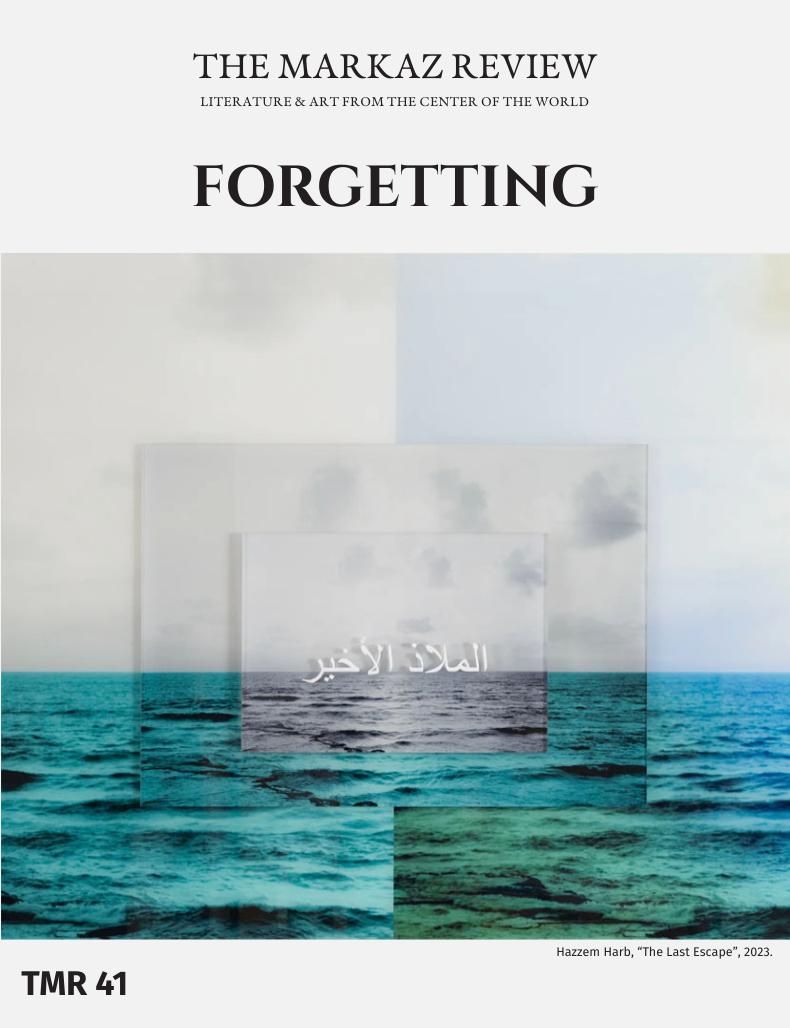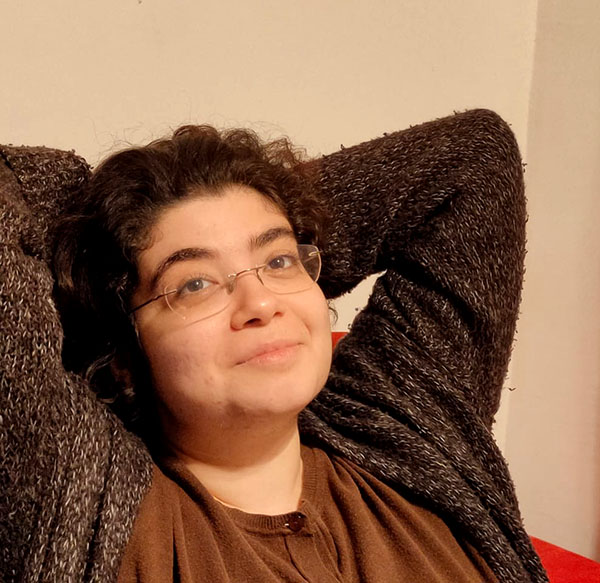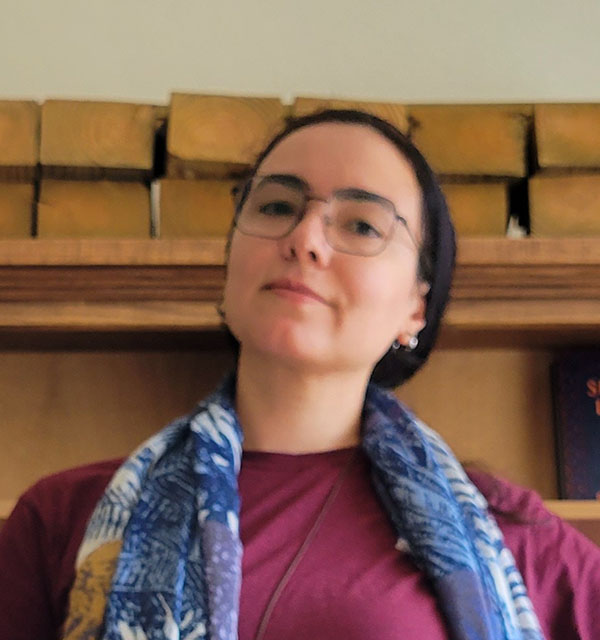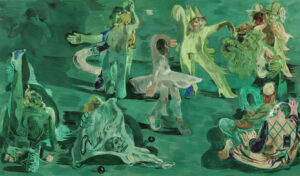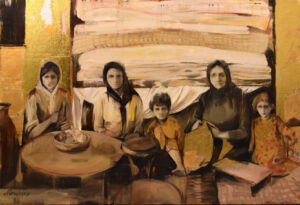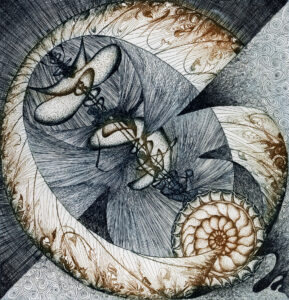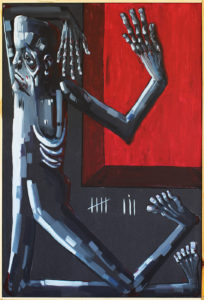The intertwined fate of a potted plant and forbidden, young love suddenly flowers.
Mama said we could go to the flower shop today, and that I could buy any flower I wanted as long as I would water it every day, study my lessons and keep my grades high. She said it with genuine pride and a desire to reward me for my unmatched academic success.
Now I believe the entire story started there, at the wild flower shop — those flowers whose lives become dependent on us the moment we pull them out of the ground and lock them up in houses of brick and mortar. My alleged right to own plants and do whatever I pleased with them was a very enticing idea. Since I’m scared of animals and cannot adopt a cat like girls my age usually do, owning a plant was the only option left for me.
The plant shop opened recently in the biggest mall in town. We went there at night, and my heart throbbed while walking around the supermarket hunting for the items on Mama’s long shopping list. We placed the plastic bags in the car trunk, and trying to keep up with my parents’ slow pace, we all headed towards the light at the heart of my anxious heart: to the flower shop. I felt nauseous and started sweating. I realized then that excitement and fear are so much alike!
As usual, the various types of cactus attracted Mama’s attention, but I sneaked between her and my father and made my way towards the flowers whose scents penetrated my nostrils and filled my heart with feelings I could not possibly describe. I had to make a choice — and I tentatively chose three flower plants: a jasmine, a nasturtium — whose lush burgundy reminded me of the color of the human heart in my biology textbook — and a cotton flower. I expressed my hesitation to Mama, and, as always, I asked for her help. She pulled herself away from the pots of cacti to take a look at my finalists. She sternly reminded me I had to choose only one, and she would rather I picked a cactus because it would not wither in case I forgot to water it. Her suggestion infuriated me enough to remind her of her promise — why should I bother with the high grades then? Wouldn’t it be better if, instead of studying, I spent my time having fun like all children my age, listening to Amr Diab, Ihab Tawfik and Mostafa Qamar or watching Spacetoon with my brother?
I said that to bring to her imagination the thing she dreaded the most: me neglecting my studies. I was obviously lying because studying was the only thing left to do ever since she banned me from buying cassettes and limited my TV time. Yet, my lie hit a cord and her face turned red with embarrassment. She let out an abashed laugh and asked the Syrian salesman to explain the character of each flower in order to help me choose. The salesman said the jasmine represents happiness and harmony, and its strong aroma heals psychological ailments like depression and chronic sadness. The nasturtium, he continued, is an ancient flower exchanged by lovers for its lively colors of yellow, red and white, but, in fact, it is a soulless flower representing indifference and restraint. The cotton flower is fragile and requires patience and unwavering care; the slightest act of negligence will sentence it to death, and that is why it represents frailty.
Laughing, my father blurted out: “Definitely you will choose the jasmine!” My parents were both taken aback when I chose the cotton flower.
Mama’s calm face suddenly turned grim and she wrenched the cotton flower pot off the table asking my father to pay for it so we could go home. We left the shop without her taking a second look at the cacti. On the way back, she neither spoke nor looked at me. However, I didn’t care — I was holding the cotton flower in my arms, trying to shield it against the gusts of wind blowing from the car window. I imagined how happy I would be taking care of my cotton flower and proving Mama’s doubts wrong. I would realize this dream of mine, the same way I had always realized my academic goals.
At home, while I was preparing my bed for sleep, Mama came and stood at the door of my room. In the half-light stealing down from the hallway, I saw her face as she firmly uttered: “If this flower ever dies, you will bear full responsibility. The flower has a soul, and I will not be judged by God for killing a soul because of your negligence.”
I didn’t say a word, nor did I try to stand up for myself. I laid in bed knowing beforehand that her words would deprive me of sleep. My fear for the flower almost turned into hatred; I wished I had not picked it, I wished I had not gone to the flower shop that day, or any other day for that matter. In the following days, my insomnia was only relieved by my continuous efforts to care for the flower without any instructions from Mama. I watered it. I exposed it to sunlight the exact amount of hours it needed. It was the summer vacation and I had ample time, but when school started, I would have to cut time out of my daily study schedule to look after it.
As per Mama’s arrangements, the semester started a month or two earlier for my brother and myself. And because we were not citizens of this country and, hence, not allowed to join official schools, my mother took it upon herself to teach us the subjects in Arabic, and science and math in English. By the time I made it to the first year of secondary school, I was fully capable of performing the most complex mathematical equations only in English, whereas I failed to read numbers and simple equations in Arabic. As of the following year, I had to study French by myself since Mama could not speak it. I would join a study group put together by a French tutor in her house, along with other students who were, no doubt, more advanced in French — the language I failed to comprehend yet rang like music in my ears.
I related this story to the flower while talking to it for hours, anxiously waiting for its cotton to bloom. And as I carried it back and forth between the window and my bed, and as I watered it at night and touched its leaves which felt like the pages of an old book between my fingers, I asked it for advice. The flower inspired me to resort to the internet while Baba was away from work — the internet service back then was still costly — but the idea was to ask people in online forums for tips to help me learn the new language. The flower also suggested I should read the French comprehension book before my classes started.
The flower’s advice proved invaluable. By the time it bloomed for the first time with soft cotton bolls, I had already made great, individual strides in French, and I joyfully stored its petals in the same closet where I kept my books and notebooks to later moisten them with a few droplets of rose water, as instructed by Mama, and run them over the private parts of my body after my menstrual blood had stopped flowing. Those were the only days I was distracted from studying as a result of the intolerable pain.
On one of those days when my lower abdomen was throbbing, I was at the French tutor’s house, sitting in a chair away from the other girls, trying my best to listen but to no avail. Like them, I was looking at the board, but I could not see it. I used the last bit of energy I had to stay strong and not collapse onto the ground and scream in front of everyone. All of a sudden, a hand reached out to me, touched my shoulder, and a voice asked if I was all right.
I could not say I was. I looked where the voice came from, and I saw a veiled classmate I had never seen in the group before. She had light eye color and light skin. I whispered to her to discreetly ask the teacher’s permission to excuse me — I could not take it any longer; I needed to return home. My classmate was appalled the moment she saw my face and heard my voice; she offered to come with me to make sure I was okay. She informed the teacher who stopped the lesson at once, escorted me out of the classroom, and offered me a pain reliever from her drug cabinet. I refused to take the pill because the early ingestion of painkillers would affect my fertility, according to Mama’s instructions which I obediently followed even though I did not understand what fertility was precisely.
The teacher made me some hot anise tea and led me into her bedroom where I slept on her bed until my father arrived. The same classmate who helped me earlier entered the bedroom and helped me out of bed then to our car where Baba kept asking what was wrong with me. I refrained from answering.
At home, I vomited more than once, not only because of the pain, but also because of the guilt of missing a class … the guilt of letting new information fall into the void without me being there to catch it … the guilt of not holding up as I normally did. Had the flower’s fragility seeped into me during the few days of our acquaintance? While the hours went by slower than pond water, it did not cross my mind to inquire about the name of the classmate who helped me, or how she realized I was in pain despite the façade I was hiding behind.
The cotton flower tried to cheer me up. It glowed in the neon light. Mama passed a decree that I was not allowed to attend the study group classes during my period. And when I told her about my teacher’s suggestion to take pain relief drugs, she said she would think about it, and that she would ask the family pharmacist. The blood that flowed out of my guiltless body was becoming an unjust punishment. For the first time I felt that it would ruin my future, and I wished it would stop.
Such dark thoughts nestled in my head for an entire week through which I did not leave home until it was time for the next French class. My anger took hold of me and I abstained from doing anything including studying. I avoided everyone, and the only company I tolerated was my little brother while he was watching TV, and, of course, my cotton flower. When I walked into the classroom in the teacher’s house, I found the girl sitting in the chair nearest to the door. She asked me: “How do you feel now?” Her face lit up as if she had known me forever. I remembered what she had done for me, and politely asked: “What’s your name?” She replied: “Soha.” I told her my name to which she quickly responded: “I know. How are you now?” Then she stretched an arm to draw a chair closer and beckoned me to sit next to her.
I was not used to companionship, and apart from my brother, I did not usually have conversations with other people. The girl told me that in the class I missed they learned verb être and its six different conjugations. This was a lesson I knew by heart — gladly, I had not missed a lot. My mood started to lighten and I paid more attention to the lesson and, from time to time, to Soha’s encouraging and reassuring looks which left me confounded. The favor she had done me last time prevented me from ignoring her as I usually do with the other classmates. At the end of the class, Soha insisted on walking with me to our car and she asked for my home phone number. I told her I would have to ask Mama’s permission first to be able to receive calls from her. With a smile, she said we would meet next time. I replied, “Sure thing!” while automatically closing the car door, without smiling at her or even returning the wave I saw her make in the rearview mirror.
Mama agreed to give Soha our home phone number on one condition: she would never call unless she – Mama – was at home, and that the call should be at daytime and not, under any conditions, exceed 30 minutes. Then she sat in front of me and with a concerned tone asked: “What are you going to talk about?” I had no idea how our phone calls would go, so I muttered: “I don’t know — maybe about the cotton flower,” she drew closer for further interrogation and I concluded, “and perhaps Spacetoon programs.”
I had never really seen Soha until it was her turn in the class to answer the teacher’s question about our favorite hobby. She spent quite some time thinking, more than any of us, then in perfect French she answered: “I like to play short pieces of music on the piano.”
That was, I think — the first sign on the road. The other girls answered the question too; one said she liked to talk to her mother; another to look at herself in the mirror; and I briefly talked about the cotton flower. However, Soha playing the piano was the only image that took over my imagination and snatched me out of the coldness that had previously kept my mind from wandering aimlessly beyond the walls of academic achievements.
“Do you really play the piano?”
“Yes, if you visit me, I’ll play for you.”
How I felt then was similar to how I felt standing before the three flowers in the flower shop — my heart was about to burst, but at this moment, it did burst. I examined her face as if it was the first time I really saw her. My guess was that she knew what I was going through by seeing her full image reflected clearly in my eyes. That day she gave me a hug, and it was not a short hug compared to the time needed to write down these words. I said, “Till we meet again,” and I meant every word.
I related this incident only to the cotton flower — only the cotton flower could understand. I grew more attentive to stories of friendship between girls on Spacetoon. My brother was more versed in Spacetoon programs, so I began to question him: “How can a girl ask another girl to be her friend?” He pondered the question and answered: “I don’t know. They just become friends, effortlessly.”
“How can a girl express her love to a friend?” I asked again, to which he said, “Maybe by giving her a simple gift? Like your flower!”
“No, there was no way I would give her the cotton flower,” I fired back and walked away while I could still hear him shouting: “But you don’t even have friends!”
From that moment on, I decided I would have friends, and by “friends” I meant Soha. In the classes that followed, despite my strong feelings for her and the long nights I spent with her in dreams relating the silly stories of my life, I could not maintain a conversation with her. Our few verbal exchanges outside the class would turn into questions on her side and brief answers on mine. I could not even label my incompetence as “shyness,” because my lack of experience with people precluded my knowledge of the ideal social behavior I should be compared with. I would feel instant frustration upon leaving the teacher’s house for failing to utter what I had been preparing myself to say to her all week, and I did not even know why.
In the meantime, I opened a YouTube page and in the search bar typed the word “piano”… and I listened. The music stirred my insides the same way my father gently stirred his cup of tea. I was carried on a cloud of memories of Soha’s presence, and I wanted to ride the cloud in this dreamy state to Soha — to tell her about how I felt towards her without having to utter a word. I listened to the first movement of Beethoven’s sonata, the musician whose name was frequently mentioned with reverence in the French language book. I closed my eyes, and instead of his somber pictures holding his music sheets, I saw Soha sitting at the piano: beautiful, playing the sonata, and I’m sitting behind her completely consumed with otherworldly fascination.
I woke up to my father’s nudges and his suspicious questions about how much time I spent on the internet and whether I knew how much it was going to cost him. The music was still playing in the background, and a soft apology slipped out of my mouth. Even my pleas to not tell my mother were soft-spoken. It was impossible they would have any effect on him.
Next class, I would have to say something to Soha — I did not know what it was but it had to paint a picture of how I felt while listening to the music on YouTube. At that age, I knew what passion was without even knowing the word for it. I stood before her, after the class had ended and the other girls had left, and I surprised myself by saying: “Soha, I love you.” It felt like my tongue had been possessed. Upon hearing my words, she blushed, then looked around to make sure nobody could see us, and turned to face me again. She hesitated shortly, her entire body quivered, and she hugged me — she pressed my body against hers several times, and my nostrils were filled with her jasmine fragrance. When the teacher’s voice drew nearer, our bodies parted spontaneously. I struggled for a while to regain my sense of time and place, and to separate the boundaries of my body from hers.
That was the longest week I spent between two classes. I was pushed off the ship’s mast directly into the sea, and the laws of physics, which I detest so much, could not help me rebound or even make it back to the ship’s deck. I helplessly plunged downwards. I was weightless and everything I previously cared about was rendered insignificant: my obsession with studying, my submission to my mother’s decrees — everything around me felt light, ephemeral. Everything faded away except for Soha’s serene face that looked like she had just woken up, or about to go to sleep. Her green eyes, her slightly-crooked thin nose, the few freckles on her cheeks. All I wanted to do was to listen to music while thinking of her. My ears devoured every single musical note it heard, from commercials to TV series to movies to opening and ending credits, and even shrill mobile ringtones.
I fell in love with Soha. When I heard myself say these words I wondered if this love differed from the ones I saw in romantic movies. My love for Soha was of course a secret, and it was then that I understood the importance of friends with whom we can share our deepest secrets. In the following days, it was Soha who orchestrated the development of our story. First, during the times we were alone in the classroom, she would come closer and murmur, “How are you?” I watched her body shiver and I knew she would hug me. Our hugs were long, or grew longer in time. At first, I pulled myself away from her in shame, but her eyes would meet mine with reproach, a look I had to live with until we met again.
The place whence my menstrual blood flowed began to painlessly discharge these milky droplets leaving a mark on my underwear every time I saw Soha. I knew later that this milky fluid had a distinctive smell, and that it could wet the tiny cotton seeds and render them useless. I thought I was the only one whose body discharged … this thing, and that Soha did not experience what I was experiencing. But when our hugs started to last longer and her body moved gently while I was in her arms, I figured she knew.
I could not ask the question because this relationship, blossoming in spite of the teacher, my parents, myself, and Soha, seemed irreversibly mysterious, and I had no intention of solving life’s mysteries as long as I was not rewarded with high grades. Eventually, Soha and I shared an undisclosed goal: to keep what we had shrouded in utmost secrecy. When I think of the reason why, I remember her cautious eyes stealthily checking the door before she whispered, “Come here.” These two words made me believe our relationship would last forever. I started to wash my underwear myself, making up excuses to avoid sending it to the laundry lest my mother would know.
Know what? I did not know.
No matter how long we hugged, it never felt enough, so we started to phone each other from time to time. My mother’s inquisitive interruptions were expected: she asked whom I was speaking to (Soha was the only one who called!), what we were talking about, and whether these calls were a bad influence. The pristine feelings I had been experiencing began to pave the way for regular nightly delusions, but I tried to keep calm in order not to face the possibility of being grounded at home and banned from going to French classes.
In addition to that, my father often rebuked me for the obvious increase in the phone bill — I could not deny it because they knew Soha’s phone number, and the billing statements detailed precisely how many times I phoned her and for how long. During our short telephone conversations, we did not really share anything new; we only shared the fear, of things we knew, and others we were not even aware of.
“Yearning” is the word that can best describe the flames flickering in our hearts, and which our surreptitious hugs were unable to abate. But why do I always use “our” and deprive Soha of her right to tell her story in the third or the first person?
She beseeched me more than once to go back home with her, and I certainly do not need to speak of my mother’s reaction if she had known I even entertained such an idea. In time, Soha became incredulous of Mama’s decrees and more distant from me. “What’s wrong?” I asked her during one of our hugs after she had forgotten to check if anybody could see us. “Nothing,” she replied coldly. I was too proud to press her further.
With the lack of consolation and the motivation to study, I busied myself with trying to look at things differently: what did I really know about Soha’s life? How many conversations or arguments did we have? I realized then that the menstrual pain in my lower abdomen pales in comparison to the pain in my chest which now missed Soha’s touch. The pain made room in my heart for questions and doubts; I was torn between missing the class so that she would have a chance to reflect and regret, and attending the class without talking to or even looking at her — in other words, we would go back to being strangers. My short years of inexperience did not prepare me for what was to come.
In our next class, I saw Soha hug a classmate the same way she used to hug me — the other girl, however, had a thoughtless expression of indifference on her face. There was nothing I could do: I opened my book, asked the teacher my last question, and left without saying goodbye.
I retreated from everything, not just Soha: the French class, the teacher, the little details — not the details of the life around me, I had never really cared about them, but the details of the life inside me. While showering, I would avoid touching my chest, my waist, and my shoulders, everything Soha had touched. I used the only word I saw fit to describe what she had done: betrayal. I could not cry; I had not studied that lesson before and, for the first time in my life, I failed.
Soha called several times, but I always instructed Mama to tell her I was asleep. To explain my behavior to Mama, I had to come up with convoluted excuses about how Soha’s friendship was wasting my time and distracting me from studying. I told her I would stay home. I told her I did not need a teacher, or anybody else. I told her I was not fit for friendship. I told her, from that moment on, I would depend on myself. Mama was astonished, but, luckily, her work at the time stopped her from investigating further.
I was preoccupied at first with creating distance between Soha and myself, thinking it was the only way I could avenge myself, but I was made aware of the insidious feeling creeping up my heart when I picked up the phone by mistake one day and heard her quivering voice after I said a spontaneous “Hello?”
“I miss you! I miss you!” She sounded thirsty for the water of my voice, and I never thought I needed to hear hers too. “Don’t hang up! I’ll play the piano for you. Listen!” she continued. Then she started to play Beethoven’s sonata, the one I knew by heart, heartbeat by heartbeat — if music had heartbeats. I never told her how much I loved the piece or how many times I fantasized about her playing it instead of Beethoven. I could neither take the phone away from my ear nor stop listening to her voice. I started crying tears I had been holding back for three menstrual cycles, since this love first blossomed. I did not care to hide my tears from my mother; quite the opposite, I wanted her to see them, but she was not there. When Soha stopped playing, I hung up.
I screamed out loud. I cried. I threw myself to the ground before my parents and writhed in agony. I told them my abdomen was killing me, but, in fact, it was my heart. I knew well that there was no place for the heart in my parents’ life. I blamed Mama because, unlike all mothers who gave their daughter painkillers, she watched me suffer. Consumed by guilt, they eventually took me to the hospital and bought a long list of pain relief drugs. I was not relieved though, and I refused to allow them any sense of relief, to the point that my little brother stopped watching “The Friends’ Pledge” on Spacetoon and started crying with and for me.
As far as the world is concerned, this story never happened — there is no proof it did. Soha herself might have forgotten all about it. Nevertheless, I do have proof: by the end of that year, I had passed my exams with high grades as usual, but the cotton flower had been long dead.




